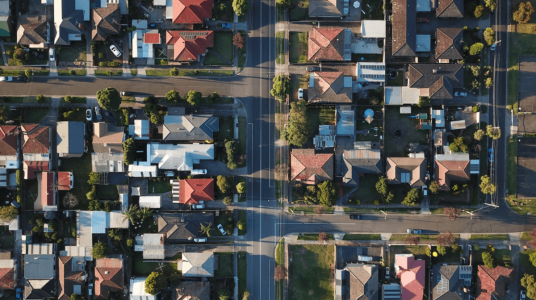Is the housing crisis about to hit a breaking point? Kochie demands action before 1.5 million new migrants arrive
- Replies 14
Housing has become quite the hot topic Down Under, stirring up conversations and concerns among Aussies. Affordable and cosy housing is an absolute must for everyone, but it takes on even greater significance for those who are busy planning their dreamy golden years.
Lately, the Australian housing crisis has hit a boiling point that's got people's attention. Even David Koch, the beloved Sunrise host and all-around advocate for various causes, is raising his voice and demanding a solution.
With a whopping 1.5 million new migrants expected to make their way to the Land of Oz over the next five years, many are thinking it's high time we address this issue head-on.
According to the latest budget figures, Australia's population is predicted to skyrocket from 26.5 million to a staggering 28.172 million in just half a decade. Brace yourselves for a record-breaking influx of 400,000 arrivals in 2022-23, followed closely by 315,000 in 2023-24.

Opposition leader Peter Dutton has criticised the government's migration forecast, claiming that the influx of people will only worsen the already critical housing and rental crisis in the country.
Speaking with Kochie, Mr Dutton said, 'The fact is we're in a housing crisis, and the middle of a rental crisis, and we're already stuck in congestion going and picking the kids up from school. Adding another 300,000 people a year over the next five years, where are these people going to live?'
This question resonates with many Australians, who also share apprehensions about the potential consequences of such growth on local communities, educational institutions, and infrastructure. The pressing question remains: What provisions are in place to support both the incoming migrants and the existing population?
Mr Dutton underscored the significance of comprehensive planning before settling new migrants in specific areas. He advocated for thorough assessments of neighbourhoods, prioritising locales with ample capacity in schools and communities, and ensuring that infrastructure receives necessary upgrades to accommodate the anticipated surge in population.
In addition, Kochie highlighted that home-building figures have hit a decade-low, and the anticipated surge of migrants, which he described as a welcome development, would only add to the prevailing housing crisis.
Kochie then pressed Mr Dutton on the solution to this issue and urged him to provide a clear explanation of how he intends to address the housing and rental market.
'It's difficult... You can put a lot of money in, but ultimately, the decision to develop land is a decision for a local council and a decision for state planning authorities,' Mr Dutton replied.
He emphasised the necessity of proactive planning, particularly considering the staggering number of 1.5 million people to be accommodated within a five-year period amid an ongoing crisis.
Mr Dutton acknowledged the incredible contributions of Australia's migrant community but stressed the importance of executing the process in a strategic and well-thought-out manner.

Echoing Mr Dutton's concerns, Fairfield City Council Mayor Frank Carbone also spoke to Kochie about his views on the influx of migrants.
While acknowledging the benefits that migration brings to Australia, he expressed his apprehension regarding the government's plan to accommodate 1.5 million new migrants within such a short timeframe.
Mayor Carbone cautioned that this rapid increase in population may result in a reduction in the quality of life for current Australian residents. He criticised the government's 'dump and run' approach, emphasising the necessity of thorough planning and sustainability measures for accommodating migrants.
'These things need to be planned. We need migration, but we need to be sustainable,' he said.
Amidst the ongoing discussion, Kochie stressed the need to avoid engaging in a blame game regarding the slow development application approval processes and perceived bureaucratic obstacles hindering housing development. Instead, he called for a unified effort from all levels of government and communities to collaboratively find a solution to the housing crisis.
Expressing his frustration, Kochie emphasised the importance of moving beyond political finger-pointing and instead focusing on collective problem-solving, saying: 'We gotta stop politicising it and blaming each other. We gotta come up with a solution.'

As the debate surrounding Australia's housing and migration crisis continues, it's clear that there are no easy solutions to this complex issue. With rising population numbers and increasing demand for affordable housing, it's vital that we all work together to find a way forward that benefits both new and existing residents.
What are your thoughts on this matter? How do you envision a path forward that meets the housing needs of all, embraces migrants, and safeguards the cherished Australian way of life? Let us know in the comments!
We welcome all opinions and viewpoints on this important issue. However, we must also remind everyone to engage in constructive dialogue with respect and kindness towards each other.
The discussions around housing and migration can be emotional and personal for many individuals, and it's essential to maintain a respectful and inclusive environment where everyone feels comfortable sharing their views.
We urge everyone to express their opinions in a civil and thoughtful manner and to avoid any language or behaviour that may be harmful or divisive.
Lately, the Australian housing crisis has hit a boiling point that's got people's attention. Even David Koch, the beloved Sunrise host and all-around advocate for various causes, is raising his voice and demanding a solution.
With a whopping 1.5 million new migrants expected to make their way to the Land of Oz over the next five years, many are thinking it's high time we address this issue head-on.
According to the latest budget figures, Australia's population is predicted to skyrocket from 26.5 million to a staggering 28.172 million in just half a decade. Brace yourselves for a record-breaking influx of 400,000 arrivals in 2022-23, followed closely by 315,000 in 2023-24.

Australia's population is projected to increase from 26.5 million to 28.172 million in five years. Credit: Unsplash/Tom Rumble.
Opposition leader Peter Dutton has criticised the government's migration forecast, claiming that the influx of people will only worsen the already critical housing and rental crisis in the country.
Speaking with Kochie, Mr Dutton said, 'The fact is we're in a housing crisis, and the middle of a rental crisis, and we're already stuck in congestion going and picking the kids up from school. Adding another 300,000 people a year over the next five years, where are these people going to live?'
This question resonates with many Australians, who also share apprehensions about the potential consequences of such growth on local communities, educational institutions, and infrastructure. The pressing question remains: What provisions are in place to support both the incoming migrants and the existing population?
Mr Dutton underscored the significance of comprehensive planning before settling new migrants in specific areas. He advocated for thorough assessments of neighbourhoods, prioritising locales with ample capacity in schools and communities, and ensuring that infrastructure receives necessary upgrades to accommodate the anticipated surge in population.
In addition, Kochie highlighted that home-building figures have hit a decade-low, and the anticipated surge of migrants, which he described as a welcome development, would only add to the prevailing housing crisis.
Kochie then pressed Mr Dutton on the solution to this issue and urged him to provide a clear explanation of how he intends to address the housing and rental market.
'It's difficult... You can put a lot of money in, but ultimately, the decision to develop land is a decision for a local council and a decision for state planning authorities,' Mr Dutton replied.
He emphasised the necessity of proactive planning, particularly considering the staggering number of 1.5 million people to be accommodated within a five-year period amid an ongoing crisis.
Mr Dutton acknowledged the incredible contributions of Australia's migrant community but stressed the importance of executing the process in a strategic and well-thought-out manner.

Mr Dutton suggests that proper planning should be done to address issues like housing, schooling, and congestion that will arise from the influx of migrants. Credit: Unsplash/Harry Cunningham.
Echoing Mr Dutton's concerns, Fairfield City Council Mayor Frank Carbone also spoke to Kochie about his views on the influx of migrants.
While acknowledging the benefits that migration brings to Australia, he expressed his apprehension regarding the government's plan to accommodate 1.5 million new migrants within such a short timeframe.
Mayor Carbone cautioned that this rapid increase in population may result in a reduction in the quality of life for current Australian residents. He criticised the government's 'dump and run' approach, emphasising the necessity of thorough planning and sustainability measures for accommodating migrants.
'These things need to be planned. We need migration, but we need to be sustainable,' he said.
Amidst the ongoing discussion, Kochie stressed the need to avoid engaging in a blame game regarding the slow development application approval processes and perceived bureaucratic obstacles hindering housing development. Instead, he called for a unified effort from all levels of government and communities to collaboratively find a solution to the housing crisis.
Expressing his frustration, Kochie emphasised the importance of moving beyond political finger-pointing and instead focusing on collective problem-solving, saying: 'We gotta stop politicising it and blaming each other. We gotta come up with a solution.'
Key Takeaways
- Australia is facing an alarming housing crisis due to an expected influx of 1.5 million migrants over the next five years, which has raised concerns among policymakers and the public alike.
- Opposition leader Peter Dutton and Fairfield City Council Mayor Frank Carbone expressed concerns about the impact on housing and quality of life, emphasising the need for thorough planning and sustainable solutions.
- Sunrise host Kochie called for unity among all levels of government and communities to address the crisis, urging an end to the blame game and a focus on collaborative problem-solving.
As the debate surrounding Australia's housing and migration crisis continues, it's clear that there are no easy solutions to this complex issue. With rising population numbers and increasing demand for affordable housing, it's vital that we all work together to find a way forward that benefits both new and existing residents.
What are your thoughts on this matter? How do you envision a path forward that meets the housing needs of all, embraces migrants, and safeguards the cherished Australian way of life? Let us know in the comments!
We welcome all opinions and viewpoints on this important issue. However, we must also remind everyone to engage in constructive dialogue with respect and kindness towards each other.
The discussions around housing and migration can be emotional and personal for many individuals, and it's essential to maintain a respectful and inclusive environment where everyone feels comfortable sharing their views.
We urge everyone to express their opinions in a civil and thoughtful manner and to avoid any language or behaviour that may be harmful or divisive.







